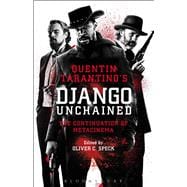Django Unchained is certainly Quentin Tarantino's most commercially-successful film and is arguably also his most controversial. Fellow director Spike Lee has denounced the representation of race and slavery in the film, while many African American writers have defended the white auteur. The use of extremely graphic violence in the film, even by Tarantino's standards, at a time when gun control is being hotly debated, has sparked further controversy and has led to angry outbursts by the director himself. Moreover, Django Unchained has become a popular culture phenomenon, with t-shirts, highly contentious action figures, posters, and strong DVD/BluRay sales. The topic (slavery and revenge), the setting (a few years before the Civil War), the intentionally provocative generic roots (Spaghetti Western and Blaxploitation) and the many intertexts and references (to German and French culture) demand a thorough examination. Befitting such a complex film, the essays collected here represent a diverse group of scholars who examine Django Unchained from many perspectives.









